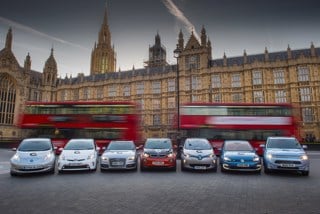Changes to Government company car tax tables, published on its website, suggest tax officials are preparing for new rates to finally be adopted.
New benefit-in-kind (BIK) tax rates, including a zero percentage rate for electric vehicles (EVs) from April 2020, were published in a Government document last summer.
At the time, the Treasury said it would bring forward legislation so the new rates could replace the previously published ones for 2020/21. But, after the November Budget was cancelled to hold a general election, the new rates were left waiting in the wings.
Now, following a reorganisation of company car tax information on the Government’s website, any reference to the original rates for the next tax year have been removed.
It has not stopped HMRC issuing company car drivers with tax codes for 2020/21, still showing the old rates, which has caused confusion for drivers expecting to be issued with codes based on the proposed tables. But, with the Chancellor, Sajid Javid, announcing his first Budget on March 11, and the previously agreed rates being omitted from official sources, it suggests the wait may finally be over.
During a visit to the new £350 million Trafford Park tram line project in Manchester, the Chancellor said he intends to use the Government’s first Budget to deliver change.
“With this Budget we will unleash Britain’s potential – uniting our great country, opening a new chapter for our economy and ushering in a decade of renewal,” he said.
The Treasury remains tight-lipped over the Chancellor’s tax plans, but Tim Anderson, head of transport at Energy Saving Trust, says the proposed rates, if adopted, will help get people back into ‘clean’ company cars.
“It will be a really great way of providing an incentive for EVs in company car fleets,” he said.
March’s Budget will allow the new BIK tables to be adopted into law in the Finance Bill.
But, with its passage through Parliament expected to go beyond April 6 (when the new rates should become effective), it is understood the legislation will allow them to be backdated.
It is a pressing issue for fleets, with CO2 values derived from the new emissions testing regime – the Worldwide harmonised Light vehicle Test Procedure (WLTP) – due to be adopted for tax purposes from April.
Manufacturers suggest more than half of cars will see an increase from NEDC-correlated emissions values to WLTP of between 10% and 20%. Fleet News has seen increases as high as 30%.
For company car drivers and fleet operators choosing a new car from April 2020, this would result in an increased tax and National Insurance liability, when compared with an identical model.
In its response to a review of company car tax and vehicle excise duty (VED) published last July, Treasury said it would take this into account by binning the existing BIK rates for 2020/21.
In their place, it unveiled two new BIK tables for company car drivers: one for those driving a company car registered after April 6, 2020, and one for those driving a company car registered before that date.
For cars first registered from April 6, 2020, most company car tax rates will be reduced by two percentage points, with a new zero percentage rate for EVs.
The zero percentage rate was also extended to EVs registered prior to April 6, 2020, which were already due to attract a much-reduced rate of 2% for 2020/21.
Publishing the proposed BIK tables for the next three years, up to April 2023, the Treasury said rates thereafter would be realigned.
Martin Brown, managing director of Fleet Alliance Group, told Fleet News: “The announcement on company car tax last year was hugely significant for us and our sector and replaced the lack of clarity we’d seen in the previous two years.
“Provided we get confirmation from the Chancellor in the Budget in March, we now have certainty on BIK rates, which allows fleets to forward plan again.
“The zero BIK rate for EVs should be a shot in the arm for electric vehicle sales, while hybrid vehicles, with the appropriate range, will be tax-busters, too.”
Also, with the new generation of cleaner RDE2-compliant diesels not attracting the 4% diesel surcharge, Brown believes diesel will still have a key role to play for those with higher mileages.






















Login to comment
Comments
No comments have been made yet.